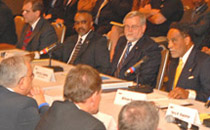National Negotiations Begin
Union Seeks 'Fair and Rewarding' Agreement
August 29, 2006

delivers his opening statement as APWU
representatives meet with USPS officials
during the first session of contract negotiations.
Negotiations for a new national agreement between the Postal Service and its largest bargaining unit — the American Postal Workers Union — began Aug. 29 at a hotel near Capitol Hill in Washington. Both sides said they hoped to have a signed agreement by Nov. 20, the expiration date of the 2000-2006 APWU-USPS contract.
“These negotiations are our opportunity,” APWU President William Burrus said in his opening statement [PDF], “to restore some semblance of stability and predictability to [union members’] lives, and to compensate them for their extraordinary efforts.”
“The platform from which we begin the process is sound,” Burrus said, “and serves as a guide for continuing our success.”
The union president offered as examples of success the positive USPS financial showing in recent years and the undisputed fact that mail volume is at an all-time high.
“The entire postal community has contributed to these accomplishments, but the employees represented by APWU have played a major role,” Burrus said. “Through their efficiencies and commitment to serving the American public, they have made exceptional contributions to this positive record.”
“The Postal Service has eliminated debt, which had reached a high of $10.3 billion in Fiscal Year 2002,” Burrus noted. And even with the burdens of a congressionally-imposed escrow account and a military-service pension-share obligation, “the Postal Service has accrued $8.4 billion in net income over the past three years.”
“A review of the specifics of this record,” Burrus said, “reveals that the cost of services performed by APWU-represented employees as a percentage of total cost has been reduced at a greater rate than that for any other group of employees. These cost reductions have come with tremendous sacrifices by the employees...
“In fact, at times they have been treated like the equipment with which they work,” Burrus said. “Change has been constant, with ever-present concerns and uncertainty about where they will work, who they will work with, and under what conditions. Despite all of these uncertainties, postal workers have performed in an outstanding fashion.”
“We shall present proposals that represent their objectives as employees of a profitable and successful enterprise,” Burrus added.
“Our objective is to negotiate a contract that is fair and rewarding. The employees we represent have been productive, dedicated, and loyal, and they deserve no less.”
Postmaster General John E. Potter echoed the APWU president’s sentiments on a number of issues. “We respect the contributions that have been made by the APWU and its membership across the board these past five years,” he said. “We really want to work out a negotiated agreement.”
The postmaster general, who took office five years ago during the interest arbitration over the expired 1998-2000 contract, said that he would like to see “an amicable agreement that builds upon the recent successes that we’ve had and continues to provide high-quality universal service to the American public.”
“I look forward to a signing on Nov. 20,” Potter said.
The next round of talks is set for Sept. 7. For further updates on national negotiations, visit the APWU Web pages at www.apwu.org.



